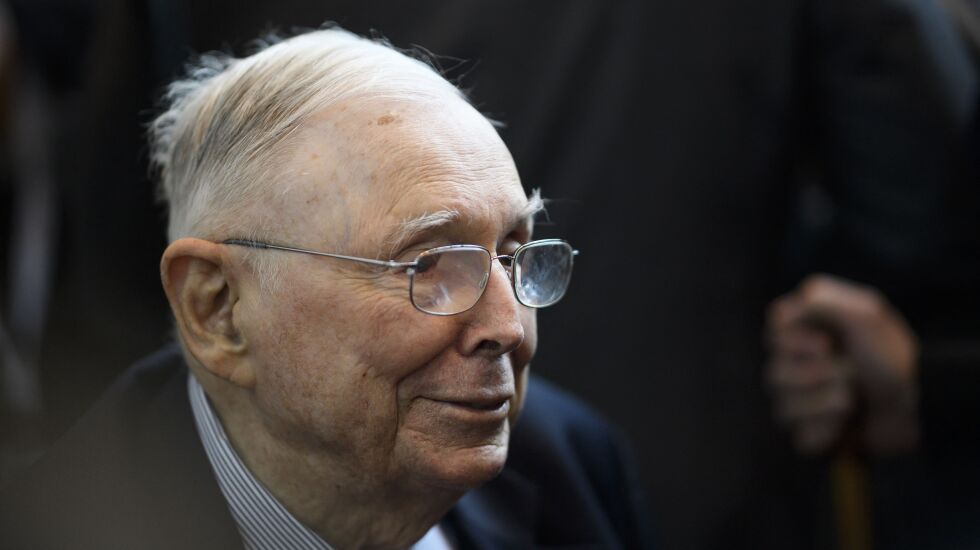
OMAHA, Neb. — Charlie Munger, who helped Warren Buffett build Berkshire Hathaway into an investment powerhouse, has died at a California hospital. He was 99.
Berkshire Hathaway said in a statement that Munger’s family told the company that he died Tuesday morning at the hospital just over a month before his 100th birthday.
“Berkshire Hathaway could not have been built to its present status without Charlie’s inspiration, wisdom and participation,” Buffett said in a statement.
Munger served as Buffett’s sounding board on investments and business decisions and helped lead Berkshire for more than five decades and served as its vice chairman.
Munger preferred to stay in the background and let Buffett be the face of Berkshire, and he often downplayed his contributions to the company’s remarkable success.
But Buffett always credited Munger with pushing him beyond his early value investing strategies to buy great businesses at good prices like See’s Candy.
“Charlie has taught me a lot about valuing businesses and about human nature,” Buffett said in 2008.
Buffett’s early successes were based on what he learned from former Columbia University professor Ben Graham. He would buy stock in companies that were selling cheaply for less than their assets were worth, and then, when the market price improved, sell the shares.
Munger and Buffett began buying Berkshire Hathaway shares in 1962 for $7 and $8 per share, and they took control of the textile firm in 1965. The shares have grown to $546,869 Tuesday, and many investors became wealthy by holding onto the stock.
During the entire time they worked together, Buffett and Munger lived more than 1,500 miles apart, but Buffett said he would call Munger in Los Angeles or Pasadena to consult on every major decision he made.
Munger grew up in Omaha, Nebraska, about five blocks away from Buffett’s current home, but because Munger is seven years older the two men didn’t meet as children, even though both worked at the grocery store Buffett’s grandfather and uncle ran.
When the two men met in 1959 at an Omaha dinner party, Munger was practicing law in Southern California and Buffett was running an investment partnership in Omaha.
Buffett and Munger hit it off at that initial meeting and then kept in touch through frequent telephone calls and lengthy letters, according to the biography in the definitive book on Munger called “Poor Charlie’s Almanack: The Wit and Wisdom of Charles T. Munger.”
The two men shared investment ideas and occasionally bought into the same companies during the 1960s and ’70s. They became the two biggest shareholders in one of their common investments, trading stamp maker Blue Chip Stamp Co., and through that acquired See’s Candy, the Buffalo News and Wesco. Munger became Berkshire’s vice chairman in 1978, and chairman and president of Wesco Financial in 1984.
Berkshire’s legions of devoted shareholders who regularly packed an Omaha arena to listen to the two men will remember the curmudgeonly quips Munger offered while answering questions alongside Buffett at the annual meetings.
Munger was known for repeating “I have nothing to add” after many of Buffett’s expansive answers at the Berkshire meetings. But Munger also often offered sharp answers that cut straight to the heart of an issue, such as the advice he offered in 2012 on spotting a good investment.
“If it’s got a really high commission on it, don’t bother looking at it,” he said.
Munger was known as a voracious reader and a student of human behavior. He employed a variety of different models borrowed from disciplines like psychology, physics and mathematics to evaluate potential investments.
Munger studied mathematics at the University of Michigan in the 1940s, but dropped out of college to serve as a meteorologist in the Army Air Corps during World War II.
Then he went on to earn a law degree from Harvard University in 1948 even though he hadn’t finished a bachelor’s degree.
Munger built a fortune worth more than $2 billion at one point and earned a spot on the list of the richest Americans. Munger’s wealth decreased over time as he gave more of his fortune away, but the ever increasing value of Berkshire’s stock kept him wealthy.
Munger has given significant gifts to Harvard-Westlake, Stanford University Law School, the University of Michigan and the Huntington Library as well as other charities. He also gave a significant portion of his Berkshire stock to his eight children after his wife died in 2010.
Munger also served on the boards of Good Samaritan Hospital and the private Harvard-Westlake School in Los Angeles. And Munger served on the board of Costco Wholesale Corp. and as chairman of the Daily Journal Corp.







